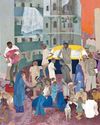The story of Ankit Saxena, the resilience and wisdom of his parents and their commitment to humanity brings immense hope in these strange times.

THIS IS NOT A LOVE STORY with a happily-ever-after, though it could easily have been. This is a story about love trumping hate, of resilience in the face of unimaginable tragedy, the triumph of sanity, liberalism and tolerance over bigotry and partisanship, and the victory of rationality over unreason. This is a story of hope, breaking the binary of life and death. This is the story of Ankit Saxena. He was murdered in February this year, yet he lives on.
A young man, just shy of turning 24, Ankit was the only child of parents Yashpal, 59, and Kamlesh, 42, and the sole earning member in their lower-middle-class household. A wedding photographer by profession, with youthful optimism, he dreamt of running a studio and having a business of his own. Growing up he was shaped by the internet, and he made funny, sometimes silly, videos with his friends that have now been viewed over nine million times on YouTube. In the prime of his life, he should have had many productive years ahead of him. That right was taken away from him. Why? He dared to love someone outside his community.
Ankit met Shehzadi as a teenager. They had been neighbours in a housing development in west Delhi’s Raghubir Nagar for a decade, where the residents are a composite of different faiths, communities and social backgrounds. There are a few inter-faith couples, too, which lends an air of progressiveness to this tight-knit community. They were friends for years before they fell in love. Their families, unaware of their intimacy, were on cordial terms.
Denne historien er fra August 2018-utgaven av Reader's Digest India.
Start din 7-dagers gratis prøveperiode på Magzter GOLD for å få tilgang til tusenvis av utvalgte premiumhistorier og 9000+ magasiner og aviser.
Allerede abonnent ? Logg på
Denne historien er fra August 2018-utgaven av Reader's Digest India.
Start din 7-dagers gratis prøveperiode på Magzter GOLD for å få tilgang til tusenvis av utvalgte premiumhistorier og 9000+ magasiner og aviser.
Allerede abonnent? Logg på

BOOKS
Books review

STUDIO - Off Lamington Road by Gieve Patel
Oil on Canvas, 54 x 88 in

NEWS FROM THE WORLD OF MEDICINE
FOODS THAT FIGHT DEMENTIA

TO HELL AND BACK
The Darvaza crater in Turkmenistan is known as the Gates of Hell. I stood on its edge - and lived to tell the tale

THE SNAKE CHARMERS
Invasive Burmese pythons are squeezing the life out of Florida's vast Everglades. An unlikely sisterhood is taking them on

Sisterhood to Last a Lifetime
These college pals teach a master class in how to maintain a friendship for 50-plus years

...TO DIE ON A HOCKEY RINK
ONE MINUTE I WAS PLAYING IN MY BEER LEAGUE, THE NEXT I WAS IN THE HOSPITAL

Just Sit Tight
Broken, battered and trapped in a ravine for days, I desperate driver wonders, \"Will anyone find me?\"

Allow Me to Mansplain...
If there's one thing we know, it's this: We're a nation of know-it-alls

THE BITTER TRUTH ABOUT SUGAR (AND SUGAR SUBSTITUTES!)
It's no secret that we have a serious addiction. Here's how to cut back on the sweet stuff, once and for all.